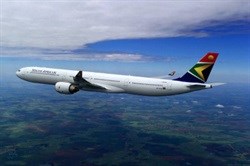






The department denies that it is essentially protecting the turf of embattled national carrier South African Airways (SAA).
The dispute between the department and Emirates airline over the launch of a fourth daily flight from Johannesburg to Dubai is being pursued through diplomatic channels. Emirates was forced to seek an urgent interdict last month - three days before the additional flight was scheduled to take off - when the department wrote to it saying it could not go ahead despite a bilateral agreement allowing it.
Last week Qatar Airways launched a new direct service, operating five times weekly, to replace its flights to Cape Town, which operated via Johannesburg.
While the government seeks to protect SAA, it is getting a taste of its own medicine from its neighbours. The Department of Transport says it is having difficulty expanding its bilateral agreements with Nigeria, Angola and Mozambique.
European and Asian airlines often "get better deals" elsewhere in Africa than SA, says deputy directorgeneral of civil aviation Zakhele Thwala. Emirates and Turkish Airlines are of particular concern.
SA is able to sign "decent bilaterals" with markets that are "not so attractive" and "not strategic", such as Togo and Mali, says Mr Thwala. However, it is difficult to "get even a decent bilateral" agreement in commercially viable destinations on the continent.
Foreign airlines are eating into SAA's profitable routes, says Mr Thwala. A bilateral agreement between Nigeria and Emirates has led to Nigerians travelling to Dubai to shop there en route to Sao Paulo, instead of travelling through SA and shopping here.
SAA launched its route from Johannesburg to Lagos in 1999 with four flights a week. The frequency was increased to a daily flight and the airline now has 60% of the market share on the route. About 50,000 round-trip passengers fly the route annually.
The department would like to increase flights to Nigeria, but has been unsuccessful.
The agreement with Emirates was signed in 2007 in the context of the 2010 Soccer World Cup when flight volumes were expected to increase. It is now due for review, the Department of Transport says.
"Are we content with a state of affairs where we have European airlines dominating our skies? The Department of Transport does care who brings tourists to our shores," says Mr Thwala.
However, SAA has needed little help in squandering its profits, reporting an aftertax loss of R1.17bn for the year ended March last year - a whopping 39% higher than 2012's loss. It has delayed tabling its financial statements this year.
Transport economist and aviation specialist Joachim Vermooten says a World Bank report has found that African airlines are concerned about the financial support given to SAA by the government.
"Fundamentally, the effect is equal to a direct subsidy. Any (African) country with a national carrier would be concerned that SAA would come in and wipe out its carrier," Mr Vermooten says.
"Some countries have other priorities and cannot prop up a national carrier against SAA."
SAA and SA Express are banking on bail-outs from the government to survive. SAA has a R5bn state guarantee and SA Express, one for R539m.
Comair CEO and chairman of the Airlines Association of Southern Africa Erik Venter says reciprocity is needed to ensure that SA benefits from bilateral agreements with international airlines.
"It is dangerous for SA to give away all the rights if it does not get reciprocity from other countries.
"We have to make sure we don't end up with a case where SA gives foreign carriers right to fly, but local carriers cannot get the rights to other countries," he says.
The department says bilateral agreements, by their nature, enforce a spirit of reciprocity. However, when South African airlines do not have the capacity to use the reciprocity, it is not beneficial.
Airlines Association of Southern Africa CEO Chris Zweigenthal says the biggest challenge facing regional airlines is low-cost carriers such as Fastjet and FlyAfrica, which have regional, domestic and "long haul" operations.
Source: Business Day

For more than two decades, I-Net Bridge has been one of South Africa’s preferred electronic providers of innovative solutions, data of the highest calibre, reliable platforms and excellent supporting systems. Our products include workstations, web applications and data feeds packaged with in-depth news and powerful analytical tools empowering clients to make meaningful decisions.
We pride ourselves on our wide variety of in-house skills, encompassing multiple platforms and applications. These skills enable us to not only function as a first class facility, but also design, implement and support all our client needs at a level that confirms I-Net Bridge a leader in its field.
Go to: http://www.inet.co.za